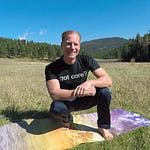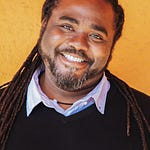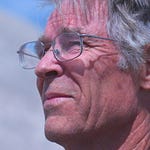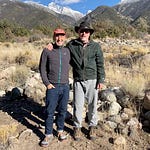This conversation is part of a series of interviews with various brothers and teachers, including many fellow writers, all of which are part of the body of work surrounding my book-length memoir An Ordinary Disaster—one man's proof that we can all learn to listen to ourselves, and to act upon the inner voice of our self, our sanity and our soul.
In this episode, I talk with my friend Michael “Roddy” McDowell, a former Navy pilot instructor who now flies wide-body commercial jets and is also a year into a Master of Social Work program at NYU Silver. He’s one of the most interesting guys that I know, and also one of the first people to come into my life directly by way of my writing.
Roddy is a man that I love and respect, whose presence I admire, and that I continue to want to get to know more deeply, all of which is why I've invited him to be with us here today.
If you’d like to listen to this show in your favorite podcast app, just paste this URL into where it says “add by URL” → https://api.substack.com/feed/podcast/25958.rss — further instructions are here.
Show Notes
Rock star status // what makes for “interesting.” Freedom to be ourselves.
The cloak of inadequacy. The pivotal moment, taking in sense of being somebody. Becoming a social worker / therapist / guide. Embodying changing identity. Excited curiosity vs tentative fear. Endings vs beginnings—and, “there is no place where I will conclude.”
Depression—and feeling shame about sharing that. Doing something—perhaps something radical—as a response to depression to get the wheel turning the other way. Turning over the card.
“I practice loving myself.” Everything’s a practice. We get good at what we do. You can practice anything, but you can’t just declare yourself to be something. Practice does not “make perfect.” There is no end—you practice.
Daily practices—not as a strict list, but as a collection of tools. The critic as a teacher.
What is “mens work?” A place to practice relating—and a sort of relational yoga. Relating is expressing, so practice relating is also practice being yourself.
The love of men. Respect. The story of love is incomplete. Our experience of the absence of love, and guarding against that leads to the conclusion that “I don’t need love,” and the soul doesn’t come alive (see the writing of Richard Rohr). The cultural stories that we tell about men not needing love, in an attempt to make ourselves feel OK with not having enough of it—to try to survive without love (see the writing of Warren Farrell and also bell hooks).
Roddy coins an expression: “The periodic table of love.” Expression. Play. Camaraderie. Brotherhood. Listening. Presence. Connection.
Access to love is access to joy.
Somatic practice. Feeling vs sensing. Interoception = the physical sensations in the interior of the body (see The Extended Mind, by Annie Murphy Paul). EVRYMAN method & Owen Marcus. Taking note of and expressing internal sensations deepens our experience.
Thoughts are not feelings. Emotions are fundamentally based in physical sensations. When you voice your physical sensations it gives me a way to understand what you are feeling that is grounded in physical reality. It’s a way of communicating more directly—it’s a practice of expressing the basic truth of what you’re feeling.
In addition to his work at NYU, Roddy is also trained as an EVRYMAN facilitator and has started offering coaching and therapy hours. You can reach him at roddypilot@gmail.com
New here? Please make sure that you’re subscribed—and remember, paying subscribers get buttons!
Dig this? Please share with someone else who will too.
Love reading?
You might enjoy some of my other writing on the subjects of depression, love, men’s work, and identity. Check out the writing of Richard Rohr, Warren Farrell and also bell hooks, and The Extended Mind, by Annie Murphy Paul.
Please stick around — I’ve got some questions for you…
Have you felt the cloak of inadequacy, and/or the moment of becoming yourself? What did that feel like?
Have you experienced depression? What does it feel like, and how have you moved through it, and/or come to live with it?
Do you have any daily, or regular, practices that help you to be yourself?
What is your experience with the love of men—and between men?















Share this post